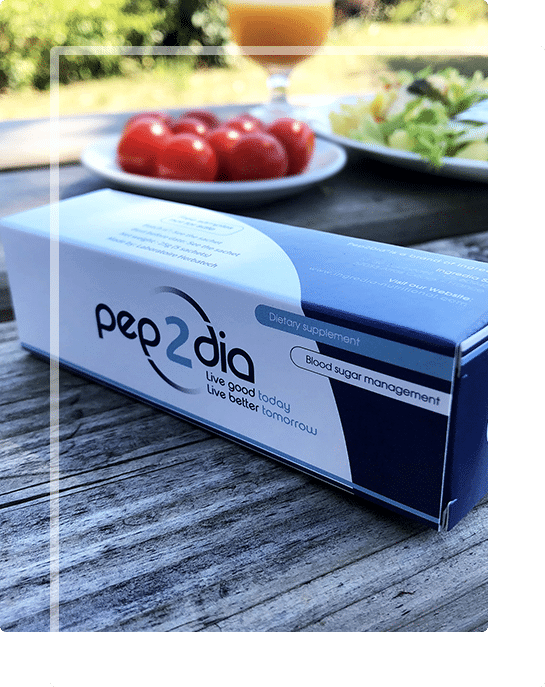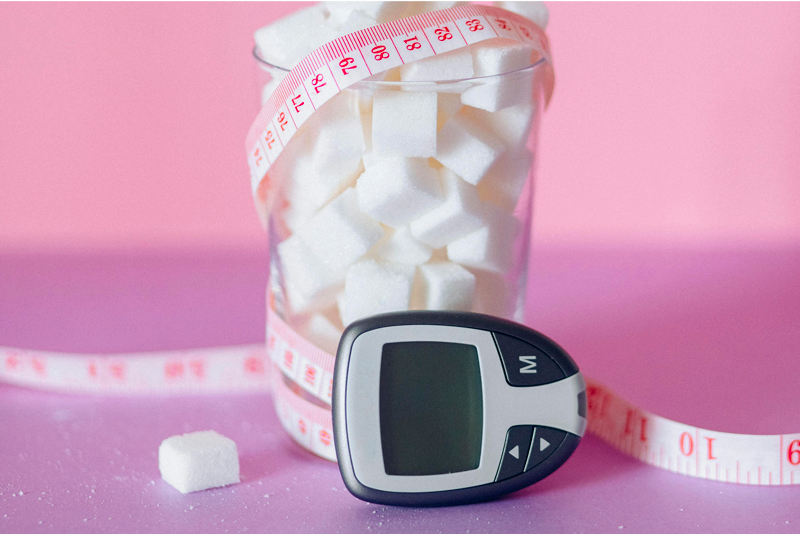

Pep2Dia® For those willing to maintain healthy blood sugar levels and improve their health.

Pep2Dia® is the first patented whey hydrolysate that helps you to maintain healthy blood sugar levels after meals and contains an AP dipeptide (Alanine-Proline).
Pep2Dia® is a product developed and manufactured by Ingredia, an offshoot of the Prospérité Fermière cooperative based in Hauts-de-France. For more than 10 years, the group has developed a whole range of natural bioactive ingredients based on milk compounds and scientifically proven to be effective.
How to better manage your blood sugar levels ?
Our bodies need « fuel » in order to function properly. More precisely, the cells of our muscles and organs feed on sugar – glucose – and oxygen. These two elements travel to them through the bloodstream. Sometimes our metabolism undergoes dysfunctions that lead to difficult or even non-existent assimilation of glucose. Here we are talking about hyperglycaemia. A correct lifestyle and certain bioactive ingredients such as Pep2Dia help lower blood sugar levels.

Role of food
Good eating habits and regular physical exercise are the best weapons for maintaining healthy blood sugar levels.

Role of physical activity
Physical activity helps you regulate your blood sugar levels, as does a balanced diet.

Stress and blood sugar
Lactium® is an ally against certain factors that can unbalance your blood sugar levels, such as chronic stress, sleep problems or eating disorders.
How does blood sugar regulation work in the body?
The continued consumption of glucose is crucial for the functioning of cells. However, sugar intake varies depending on how active the body is. When you exercise, the muscle cells work tremendously hard and demand a much larger share of glucose.
The importance of glycogen for the metabolism
Part of the glucose used comes from glycogen stores. This substance results from a transformation of the glucose that our metabolism stores over time. Why does our body produce glycogen? Like any animal, humans have adapted throughout evolution to survive periods of famine. When we consume a meal that is too rich in nutrients, the excess is stored. Lipids then join the fatty tissue, which is located around the organs and below the skin. Sugars are stored as glycogen, which seeps into muscle tissue and the liver.
During physical effort, it is the muscle glycogen that primarily nourishes the cells. Once the glycogen is consumed, the body sets off another metabolism: supplying cells with glucose in the blood. This comes mainly from glycogen in the liver. This key organ takes glucose from meals through the intestine and stores it as glycogen.
Insulin, an essential hormone in the process of converting glucose
The transformation of glucose into glycogen is carried out mainly thanks to glucagon, a hormone produced in the pancreas. Clusters of cells in the organ, called islets of Langerhans or pancreatic islets, secrete insulin and glucagon hormones into the blood.
Pancreatic cells constantly analyse changes in blood sugar. If the blood glucose level turns out to be too high, islets of Langerhans increase the production of insulin. The hormone then helps the glucose transform into glycogen and stores it in the liver and muscles.
However, if blood sugar drops suddenly, during a sports session for example, the pancreas secretes glucagon. This hormone acts on the liver by converting glycogen into glucose and releasing it into the blood.
Unfortunately, this regulatory system that is essential to the body sometimes suffers from dysfunction.
Pep2dia® helps control blood sugar levels in the body
Pep2Dia offers an AP dipeptide (Alanine-Proline), the particularity of which is to inhibit the action of a digestive enzyme called alpha glucosidase. By reducing its action, Pep2Dia limits the transformation of complex sugars into glucose, thereby reducing blood sugar levels.
Our latest publications
Want to learn more about topics related to blood sugar management?
Here are our most recent blog posts!


Contact information
51 Avenue F. Lobbedez
CS 60946
62033 Arras Cedex
France
Tel : +33 (0)3 21 23 80 00
Fax : +33 (0)3 21 23 80 01
















